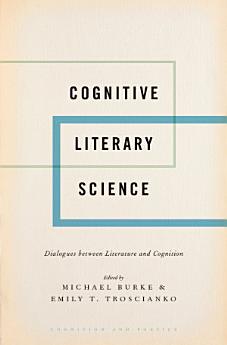Cognitive Literary Science: Dialogues between Literature and Cognition
Michael Burke · Emily T. Troscianko
ଡିସେମ୍ବର 2016 · Oxford University Press
ଇବୁକ୍
304
ପୃଷ୍ଠାଗୁଡ଼ିକ
family_home
ଯୋଗ୍ୟ
info
reportରେଟିଂ ଓ ସମୀକ୍ଷାଗୁଡ଼ିକୁ ଯାଞ୍ଚ କରାଯାଇନାହିଁ ଅଧିକ ଜାଣନ୍ତୁ
ଏହି ଇବୁକ୍ ବିଷୟରେ
This book brings together researchers with cognitive-scientific and literary backgrounds to present innovative research in all three variations on the possible interactions between literary studies and cognitive science. The tripartite structure of the volume reflects a more ambitious conception of what cognitive approaches to literature are and could be than is usually encountered, and thus aims both to map out and to advance the field. The first section corresponds to what most people think of as "cognitive poetics" or "cognitive literary studies": the study of literature by literary scholars drawing on cognitive-scientific methods, findings, and/or debates to yield insights into literature. The second section demonstrates that literary scholars needn't only make use of cognitive science to study literature, but can also, in a reciprocally interdisciplinary manner, use a cognitively informed perspective on literature to offer benefits back to the cognitive sciences. Finally, the third section, "literature in cognitive science", showcases some of the ways in which literature can be a stimulating object of study and a fertile testing ground for theories and models, not only to literary scholars but also to cognitive scientists, who here engage with some key questions in cognitive literary studies with the benefit of their in-depth scientific knowledge and training.
ଲେଖକଙ୍କ ବିଷୟରେ
Michael Burke is Professor of Rhetoric at University College Roosevelt (Utrecht University). He is the author of Literary Reading Cognition and Emotion: An Exploration of the Oceanic Mind (2011). He has published numerous chapters and articles on the topic of cognitive literary science. His areas of interest also include classical rhetoric, stylistics, and pragmatics. Emily T. Troscianko is a Research Associate in the Faculty of Medieval and Modern Languages at the University of Oxford, and in 2014-15 was a Knowledge Exchange Fellow at the Oxford Research Centre in the Humanities, collaborating with Beat, the leading UK eating disorders charity. The book from her doctoral thesis, Kafka's cognitive realism, came out with Routledge in 2014, and she is now working at the intersection of the cognitive and medical humanities, while co-authoring, with Susan Blackmore, the third edition of the psychology textbook Consciousness: An Introduction.
ଏହି ଇବୁକ୍କୁ ମୂଲ୍ୟାଙ୍କନ କରନ୍ତୁ
ଆପଣ କଣ ଭାବୁଛନ୍ତି ତାହା ଆମକୁ ଜଣାନ୍ତୁ।
ପଢ଼ିବା ପାଇଁ ତଥ୍ୟ
ସ୍ମାର୍ଟଫୋନ ଓ ଟାବଲେଟ
Google Play Books ଆପ୍କୁ, Android ଓ iPad/iPhone ପାଇଁ ଇନଷ୍ଟଲ୍ କରନ୍ତୁ। ଏହା ସ୍ଵଚାଳିତ ଭାବେ ଆପଣଙ୍କ ଆକାଉଣ୍ଟରେ ସିଙ୍କ ହୋଇଯିବ ଏବଂ ଆପଣ ଯେଉଁଠି ଥାଆନ୍ତୁ ନା କାହିଁକି ଆନଲାଇନ୍ କିମ୍ବା ଅଫଲାଇନ୍ରେ ପଢ଼ିବା ପାଇଁ ଅନୁମତି ଦେବ।
ଲାପଟପ ଓ କମ୍ପ୍ୟୁଟର
ନିଜର କମ୍ପ୍ୟୁଟର୍ରେ ଥିବା ୱେବ୍ ବ୍ରାଉଜର୍କୁ ବ୍ୟବହାର କରି Google Playରୁ କିଣିଥିବା ଅଡିଓବୁକ୍କୁ ଆପଣ ଶୁଣିପାରିବେ।
ଇ-ରିଡର୍ ଓ ଅନ୍ୟ ଡିଭାଇସ୍ଗୁଡ଼ିକ
Kobo eReaders ପରି e-ink ଡିଭାଇସଗୁଡ଼ିକରେ ପଢ଼ିବା ପାଇଁ, ଆପଣଙ୍କୁ ଏକ ଫାଇଲ ଡାଉନଲୋଡ କରି ଏହାକୁ ଆପଣଙ୍କ ଡିଭାଇସକୁ ଟ୍ରାନ୍ସଫର କରିବାକୁ ହେବ। ସମର୍ଥିତ eReadersକୁ ଫାଇଲଗୁଡ଼ିକ ଟ୍ରାନ୍ସଫର କରିବା ପାଇଁ ସହାୟତା କେନ୍ଦ୍ରରେ ଥିବା ସବିଶେଷ ନିର୍ଦ୍ଦେଶାବଳୀକୁ ଅନୁସରଣ କରନ୍ତୁ।





